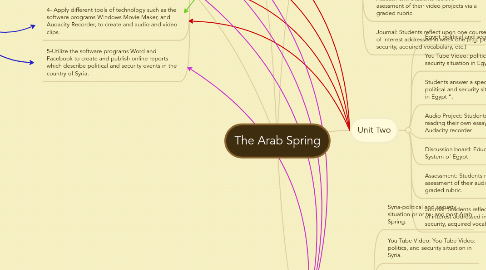The Arab Spring
por Imad Altaie


1. Standards
1.1. STANDARDS FOR FOREIGN LANGUAGE LEARNING
1.2. Standard 1.1: Students engage in conversations, provide and obtain information, express feelings and emotions, and exchange opinions
1.3. Standard 2.2: Students demonstrate an understanding of the relationship between the products and perspectives of the culture studied
1.4. Standard 3.2: Students acquire information and recognize the distinctive viewpoints that are only available through the foreign language and its cultures
1.5. Standard 4.2: Students demonstrate understanding of the concept of culture through comparisons of the cultures studied and their own.
1.6. Standard 5.1: Students use the language both within and beyond the school setting.
2. Objectives
2.1. 1-List, describe, and analyze the advantages and disadvantages of the Arab Spring on the Arabic countries (Tunisia, Egypt and Syria) specifically and Middle east generally.
2.2. 2-Compare and contrast the impact of the Arabic culture in the three countries and the different political, security and social components in the Tunisia, Egypt and Syria
2.3. 3-Learn, gain and increase their vocabularies of the target language (Arabic) by engaging them with the different activities to enhance and promote their learning of the four language skills listening, reading, writing, and speaking.
2.4. 4- Apply different tools of technology such as the software programs Windows Movie Maker, and Audacity Recorder, to create and audio and video clips.
2.5. 5-Utilize the software programs Word and Facebook to create and publish online reports which describe political and security events in the country of Syria.
3. Unit one
3.1. Tunisia-demographics, politics, security, and cultural trends.
3.2. You Tube Video: demographics, politics, security, and cultural trends of Tunisia.
3.3. YouTube Video Project: Students engage in role play to act out and video record an interview. Students upload video online for assessment.
3.4. Discussion board: Education System of Tunisia
3.5. Assessment: Students recieve asessment of their video projects via a graded rubric.
3.6. Journal: Students reflect upon one course topic of interest addressed in week one (e.g. personal security, acquired vocabulary, etc.)
4. Unit Two
4.1. Egypt-political and security situation
4.2. You Tube Video: politics, and security situation in Egypt.
4.3. Students answer a specific question: “Why the political and security situation is still not solved in Egypt ”.
4.4. Audio Project: Students work together by writing, reading their own essays, and then record it on Audacity recorder
4.5. Discussion board: Education System of Egypt
4.6. Assessment: Students recieve asessment of their audio projects via a graded rubric.
4.7. Journal: Students reflect upon one course topic of interest addressed in week two(e.g. personal security, acquired vocabulary, etc.)
5. Unit Three
5.1. Syria-political and security situation prior to, and post Arab Spring.
5.2. You Tube Video: You Tube Video: politics, and security situation in Syria.
5.3. Students answer a specific question: “Why they didn’t get their freedom yet, like the rest of Arab Spring countries”.
5.4. Students create their own online written report about the current situation in Syria and publish it on Facebook.
5.5. Discussion board: Education System of Syria.
5.6. Assessment
5.6.1. Final exam will be condected
5.6.2. Students recieve asessment of their Online written projects via a graded rubric.

